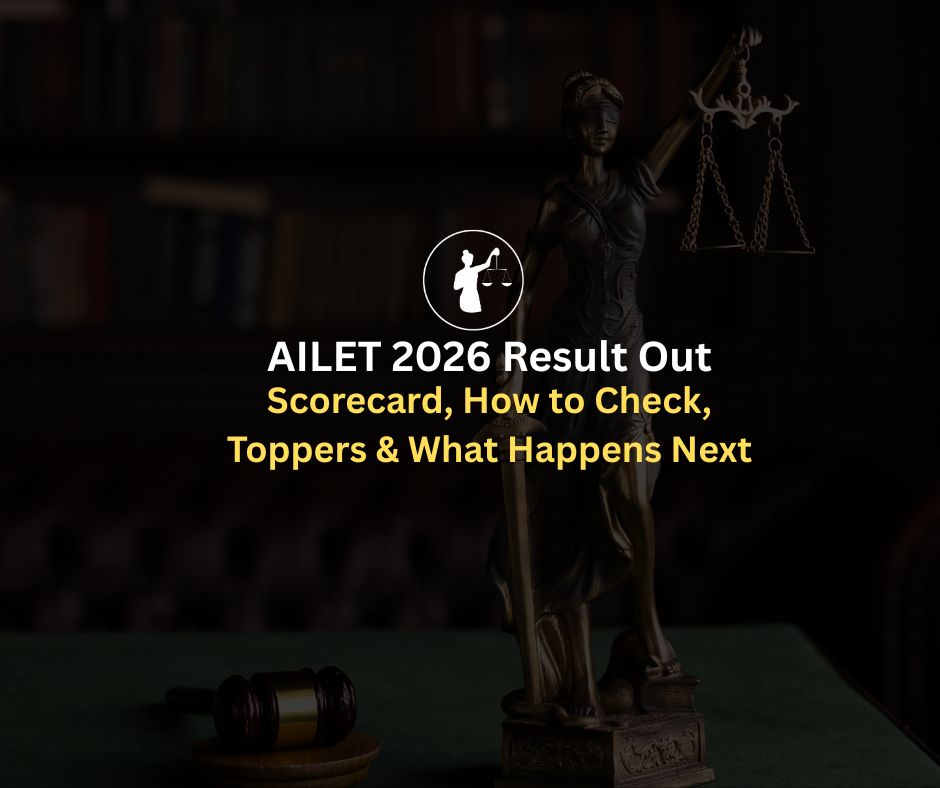If you're planning to pursue law from one of the top National Law Universities (NLUs) in India, the Common Law Admission Test (CLAT) 2026 is your gateway. Conducted by the Consortium of NLUs, CLAT is a national-level entrance exam for admission to undergraduate (UG) and postgraduate (PG) law programs offered by 24 NLUs across the country
In this blog, we break down the CLAT Eligibility Criteria 2026 in the simplest terms possible—covering age limits, educational qualifications, category-specific rules, and frequently asked questions. This guide will ensure you’re fully eligible before investing your time and effort into CLAT preparation.
( Note: Scroll Down and fill up the form for Free Mock Questions and Weekly Study Guides )
To apply for the CLAT 2026 Undergraduate (UG) program, candidates must fulfill certain academic and personal eligibility conditions set by the Consortium of NLUs. Here's a clear breakdown:
To be eligible for CLAT UG 2026, you must have passed Class 12 (10+2) or an equivalent examination from a recognized board.
Minimum Marks Required:
If you're currently in Class 12 and will appear for your board exams in 2026, you're also eligible to apply for CLAT 2026.
However, you must submit proof of qualification (Class 12 passing certificate) at the time of admission or counseling.
There is no upper age limit to apply for CLAT UG 2026.
This means students of any age can appear for the exam, as long as they meet the educational qualifications.
Also Read: CLAT Syllabus 2026: Subject-Wise Breakdown & Important Tips
The CLAT UG exam is open to:
If you’re planning to pursue a postgraduate law degree (LL.M) from a top National Law University, you must meet the specific eligibility criteria set for CLAT PG 2026. This section explains the required educational qualifications, age criteria, and rules for final-year students.
To be eligible for CLAT PG 2026, candidates must have completed a Bachelor’s degree in Law (LL.B.) or an equivalent qualification from a recognized university.
Minimum Marks Required:
If you're in the final year of your LL.B. degree and expect to graduate before the time of admission (usually by July), you are eligible to apply for CLAT PG 2026.
You must, however, submit proof of qualifying the LL.B. degree at the time of admission.
Failure to produce the degree/certificate within the stipulated time may result in disqualification.
There is no upper age limit for appearing in CLAT PG 2026.
Candidates of any age group can apply, as long as they meet the academic eligibility.
Also Read: CLAT 2026 Exam Pattern Explained
The Consortium of NLUs provides certain relaxations in educational qualifications and reservation policies for candidates belonging to specific categories such as SC, ST, OBC, PwD, and EWS. Some university-specific relaxations also apply, depending on the NLU’s internal admission policies.
Let’s break it down:
Candidates from reserved categories are offered lower minimum qualifying marks in both the 12th board exams (UG) and LL.B. exams (PG), as shown below:
Most National Law Universities follow government-mandated reservation norms, which include seat reservations for:
As per the EWS quota introduced under the 103rd Constitutional Amendment Act, several NLUs provide 10% reservation for EWS category candidates.
To claim this benefit, applicants must produce a valid EWS certificate issued by a competent government authority.
Some NLUs offer additional relaxations or quotas based on domicile or specific categories, such as:
Domicile Reservations:
Preference for residents of the state in which the NLU is located.
NRI / NRI Sponsored / Foreign National Quotas:
Separate application procedures and relaxed eligibility norms may apply.
Special Categories:
Some NLUs have quotas for children of defense personnel, Kashmiri migrants, or persons affected by terrorism.
To claim any reservation or relaxation, you must:
Select the correct category during registration
Upload valid and recent certificates
Carry original documents at the time of counseling and admission
While meeting the basic eligibility criteria is essential, there are a few lesser-known rules and conditions that candidates often overlook.
Understanding these can help you avoid disqualification or issues during the admission process.
There is no limit on the number of attempts for CLAT.
Candidates can appear for the CLAT UG or PG exam as many times as they wish.
Each attempt is treated independently; there are no restrictions on reapplying if you don’t qualify in a previous year.
If you do not meet the required minimum marks in your qualifying exam your admission will be canceled even if you clear the CLAT exam.
If you are appearing for your final exams but fail to pass before the admission deadline, your seat will not be confirmed.
Providing false information or uploading invalid certificates during registration or counseling can lead to permanent disqualification.
Failure to submit category-specific documents (SC, ST, OBC, EWS, PwD, etc.) will result in your claim being rejected during admission.
Entering incorrect academic marks or miscalculating aggregate percentage.
Selecting the wrong category during application and not uploading valid proof.
Assuming eligibility without confirming marks criteria or NLU-specific rules.
Ignoring NLU-specific requirements like domicile quotas or NRI categories.
Missing deadlines for document verification or failing to produce original certificates during counseling.
No age or attempt limit applies for CLAT 2026.
Final-year students are eligible, but they must meet minimum marks before admission.
Category and quota benefits require valid, up-to-date documentation.
Each NLU may have additional eligibility rules candidates should check individual NLU websites carefully.
Meeting the CLAT eligibility criteria does not guarantee admission unless all documents and qualifications are in place.
Also Read: How to Prepare for CLAT 2026 in 6 Months
Once you clear the CLAT 2026 exam and are shortlisted for admission, you will be required to verify your eligibility through official documents.
These documents must confirm your educational qualifications, identity, reservation category, and domicile.
Submitting incorrect or incomplete documents may lead to disqualification.
Below is a list of key documents you must keep ready:
These are mandatory for verifying your date of birth and educational qualification for the UG program.
If you are a Class 12 appearing candidate, you will need to produce the final mark sheet at the time of admission.
For those applying to CLAT PG 2026, you must provide your LL.B. degree certificate and all semester/year-wise mark sheets.
Final-year students must submit a provisional certificate or result before admission.
SC/ST/OBC candidates must produce a valid caste certificate issued by a competent authority.
OBC candidates must ensure that the certificate states non-creamy layer status and is issued within the prescribed time limit.
EWS candidates must submit a valid EWS certificate as per central government norms.
PwD candidates need to provide a disability certificate from a certified medical authority.
If you're claiming a state domicile reservation, you must produce a domicile certificate issued by the appropriate state authority.
This is particularly important for NLUs that offer home state quotas.
During counseling, you’ll need to provide a printout of your CLAT 2026 admit card and scorecard for verification and admission processing.
Keep several recent passport-size photographs ready for documentation and admission forms.
Original and photocopies of academic certificates
Valid caste/category/domicile certificates (if applicable)
Government-issued ID proof
CLAT admit card and result copy
Additional documents as required by specific NLUs
Understanding the CLAT eligibility criteria is the first and most important step in your law entrance journey. Whether you're aiming for the UG or PG program, make sure you fulfill the required academic qualifications, keep all documents ready, and are aware of reservation and university-specific rules.
So, double-check your eligibility, prepare your documents in advance, and stay updated with the latest notifications from the CLAT Consortium and NLUs. A careful approach now will ensure a smoother admission process later.
Also See: Best CLAT Online Coaching 2026
1. What is the minimum qualification required for CLAT UG 2026?
Candidates must have passed Class 12 or an equivalent examination from a recognized board.
2. What is the minimum percentage required to be eligible for CLAT UG?
General/OBC category: 45% marks
SC/ST category: 40% marks
3. Can students appearing in Class 12 board exams in 2026 apply for CLAT UG?
Yes, appearing students are eligible. However, they must pass the qualifying exam with required marks before admission.
4. Is there an age limit to appear for CLAT UG or PG?
No, there is no upper age limit for either UG or PG CLAT exams.
5. What is the educational qualification required for CLAT PG 2026?
Candidates must have completed an LL.B. (3-year or 5-year) degree with at least 50% marks (45% for SC/ST candidates).
6. Can final-year LL.B. students apply for CLAT PG 2026?
Yes, final-year law students can apply, but they must produce proof of qualification before admission.
7. How many times can I attempt the CLAT exam?
There is no limit to the number of attempts for CLAT UG or PG.
8. Which documents are required for eligibility verification during counseling?
You will need mark sheets, caste/domicile certificates (if applicable), photo ID, and the CLAT admit card/scorecard.
9. Can NRI or foreign nationals apply for CLAT?
Yes, many NLUs reserve a certain number of seats for NRIs and foreign nationals. Eligibility and process may vary per university.
10. What happens if I do not meet the eligibility after clearing the exam?
Your admission will be cancelled if you fail to meet eligibility criteria or fail to produce valid documents during verification.





